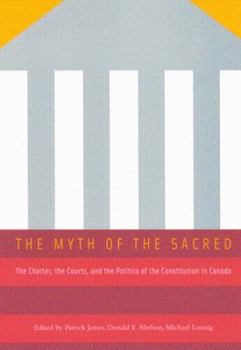The Myth of the Sacred: The Charter, the Courts, and the Politics of the Constitution in Canada
In this collection the authors challenge the myth of the sacred - that certain aspects of the constitutional process - judicial political behaviour, interest group politics, and centralization of... This description may be from another edition of this product.
Format:Hardcover
Language:English
ISBN:0773524347
ISBN13:9780773524347
Release Date:January 2003
Publisher:McGill-Queen's University Press
Length:256 Pages
Weight:1.19 lbs.
Dimensions:0.8" x 6.8" x 8.8"
Customer Reviews
1 rating
Highly Recommended !
Published by Thriftbooks.com User , 21 years ago
In the pursuit of lofty concepts, such as justice and fairness, activities of courts in adjudicating constitutional issues seem to be held sacred. But constitutional decision-making is not above the rough and tumble of politics with courts, interest groups, and other institutions pursuing self-interests. Such is the case with respect to Canada's Charter of Human Rights and Freedoms, according to the ten well-established scholars contributing to this volume. Their premise is not especially surprising. After all, where there are people, there are politics. It is, however, surprising to be presented, in one tome, with essays of the same breadth on the Charter; they focus on various judicial actors and interests, sometimes in relation to specific cases, to illustrate that judicial politics is not the realm of the sacred. It is also exceptional, in the context of Canadian judicial literature, to be presented with analyses of such depth, attached, as they are, to the theme of Rawlsian paradox in which justice-seekers, advancing fairness, actually promote an agenda of redistribution over fairness. This theme, analyzed from political philosophy and rational choice perspectives, is thus indispensable reading for philosophers, political scientists and legal scholars. Summing up: HIGHLY RECOMMENDED. Upper-division undergraduates and above. - A.F. Johnson, Bishop's University. From CHOICE.





